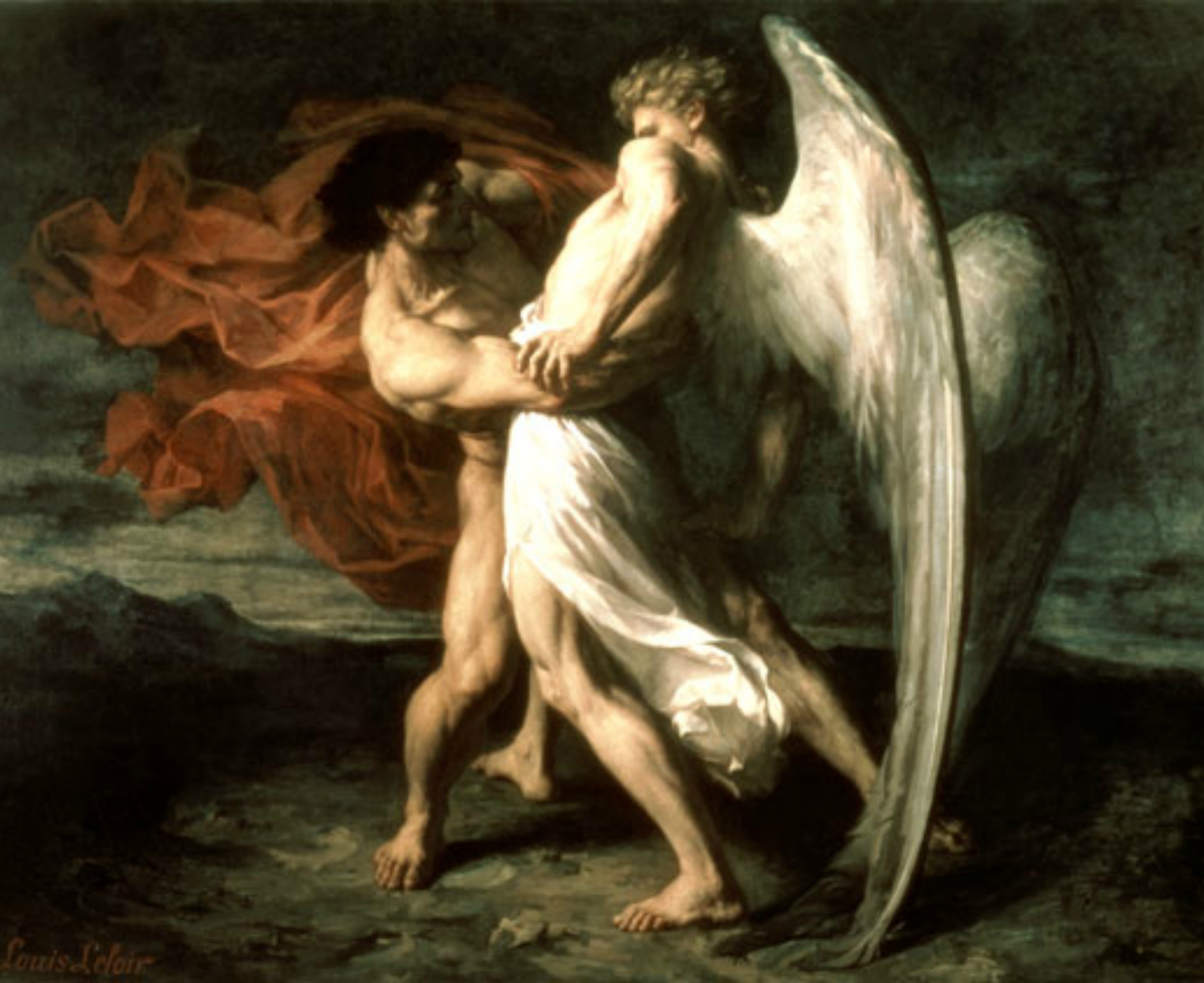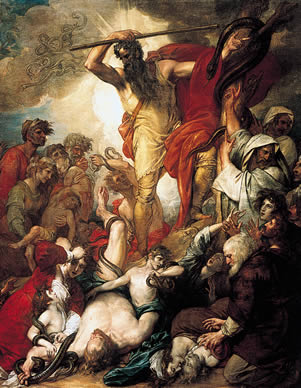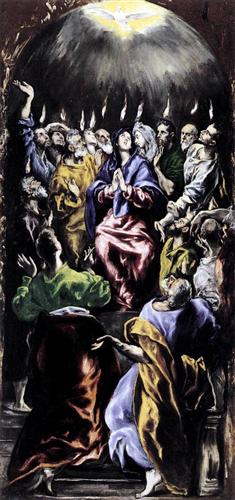
A highly stylized image – painted in 1740 – of Bithiah, the daughter of Pharoah who found the baby Moses in the reeds of the Nile River.
The readings from the Bible for August 24, 2014, are Exodus 1:8-2:10, Psalm 124, Romans 12:1-8, and Matthew 16:13-20, as discussed below.
Welcome again to DOR Scribe, a blog about reading the Bible with an open mind.
This post is about the Bible readings for Sunday, August 24. As always, you can see the full set of readings at The Lectionary Page, but here are some highlights and commentary.
The first reading, Exodus 1:8-2:10, marks a shift from the end of Genesis – with the Children of Israel being brought down to Egypt at the request of Joseph, who had become Pharoah’s right-hand man – to the beginning of the saga of Moses. Note that according to tradition, Moses wrote the first five books of the Bible, so that in those five books he was giving his fellow Hebrews the complete history of the world – as he saw it – from the beginning of time up to the point where they were about the enter the long-awaited Promised Land.
(Note also that in that history of the world, Moses had to “tell the story using language and concepts that his relatively-pea-brained contemporary audience could understand,” as was discussed in On the readings for June 15 – Part I.)
Today’s reading begins with a new Pharoah ruling over Egypt, “who did not know Joseph,” and who got greatly concerned about the number of aliens who had come to dwell in his country. (The ancient Hebrews were a very fertile people. And why does this sound so familiar?) So the Egyptians “became ruthless in imposing tasks on the Israelites, and made their lives bitter.” Pharoah tried a number of other techniques to control the foreign aliens, including a command to “throw every newborn Hebrew son into the river,” i.e., to kill every new baby boy.
But the mother of Moses came up with the idea of putting her baby son into a waterproof basket, then setting it adrift into the Nile, but near where Pharoah’s daughter came to bathe. Sure enough, Pharoah’s daughter – Bithiah, as seen above – saw the cute baby, fell in love with it and thus insured the boy’s survival. And in the fullness of time she named him “Moses, ‘because,’ she said, ‘I drew him out of the water.'” (Again, keep in mind Moses was writing about himself.)
Psalm 124 was characterized by the International Bible Commentary (IBC) as one of “divine deliverance,” using metaphors including that of a broken snare – as used to trap birds – leading to the ultimate lesson aptly summarized by Martin Luther. Luther phrased it this way, in one of his hymn best-known hymns. See A Mighty Fortress Is Our God – Wikipedia, the free encyclopedia: “Did we in our own strength confide, our striving would be losing.”
The IBC reflected that in Romans 12:1-8, Paul continued his reflection on the two sides of the Gospel – the believing side and the behaving side – and that it was “to the second side that Paul now turns.” That is, he set down some general principles ranging “over most of life and also” – through analogy – “principles to cover every situation.”
Specifically – he said – we should “not be conformed to this world, but be transformed by the renewing of your minds, so that you may discern what is the will of God – what is good and acceptable and perfect.” (Note the word discern. It’s defined as being able to “recognize or comprehend mentally,” or to “perceive or recognize as being different or distinct” and/or to distinguish, or finally to “perceive differences.” See definition of discern by The Free Dictionary. Note also that it does not mean to accept “blindly” or without thought. . .)
Paul added we should “think with sober judgment, each according to the measure of faith that God has assigned.” On that note see the “Blind Men and the Elephant,” at On reading the Bible.
And finally, the Gospel – Matthew 16:13-20 – was covered in the post On sharing the “Keys to the Kingdom”. That post discussed the fact that Jesus did give Peter the “keys to the kingdom” at one point in time, giving rise to a claim by some Catholics that only they are going to get into heaven. But it also noted that two chapters later Jesus gave pretty much the same power to all the disciples. It noted the effect of such “later-imposed statutes,” and ended with this:
But what does the Bible say? For one thing the Apostle Paul said, in Philippians 2:12, “work out your own salvation with fear and trembling.” Which is of course perfectly consistent with what he said much earlier, in Romans 10:9, “If you declare that Jesus is Lord, and believe that God brought him back to life, you will be saved.” (Emphases added.)
Which leads to an illustration of what the Christian Faith should not be about:

The upper image is courtesy of Bithiah – Wikipedia, the free encyclopedia. The caption for the painting reads: “Giovanni Battista Tiepolo, The Finding of Moses, Bithiah, 1740, oil on canvas, National Gallery of Scotland, Edinburgh.” See also, Giovanni Battista Tiepolo – Wikipedia, the free encyclopedia, which noted that this Italian painter (1696-1770), was described as “the greatest decorative painter of eighteenth-century Europe, as well as its most able craftsman.” The site further noted of some of his early works, “Despite their elevated subject matter, they are bright in colour, and light-hearted in mood . . . ‘a shimmering set of tableaux, full of wit and elegance.'”
The lower image is courtesy of http://df5eshuaiifdc.cloudfront.net/wp-content/uploads/image/Busines%20For%20Home%20Reports%202011/Member_Only.jpg. See also Members Only – Wikipedia, the free encyclopedia, and/or Members Only – Official Online Store | Free Shipping, describing the “brand of clothing that became popular in the 1980s with the Members Only jacket.”
To hear an audio rendition of “A Mighty Fortress is Our God,” with the lyrics noted above, click on “A Mighty Fortress is Our God” – Martin Luther – YouTube.
As to the “RC” claim of exclusivity when it comes to getting into heaven, note that Jehovah’s Witnesses, Baptists, Mormons, Hindus and Buddhists – among others – all make pretty much the same claim. . .


















